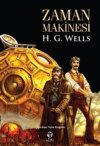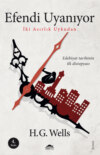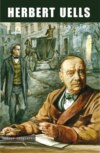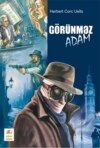Kitabı oku: «Mr. Britling Sees It Through », sayfa 12
§ 8
Soon Mr. Direck could measure the time that was left to him at the Dower House no longer by days but by hours. His luggage was mostly packed, his tickets to Rotterdam, Cologne, Munich, Dresden, Vienna, were all in order. And things were still very indefinite between him and Cecily. But God has not made Americans clean-shaven and firm-featured for nothing, and he determined that matters must be brought to some sort of definition before he embarked upon travels that were rapidly losing their attractiveness in this concentration of his attention…
A considerable nervousness betrayed itself in his voice and manner when at last he carried out his determination.
"There's just a lil' thing," he said to her, taking advantage of a moment when they were together after lunch, "that I'd value now more than anything else in the world."
She answered by a lifted eyebrow and a glance that had not so much inquiry in it as she intended.
"If we could just take a lil' walk together for a bit. Round by Claverings Park and all that. See the deer again and the old trees. Sort of scenery I'd like to remember when I'm away from it."
He was a little short of breath, and there was a quite disproportionate gravity about her moment for consideration.
"Yes," she said with a cheerful acquiescence that came a couple of bars too late. "Let's. It will be jolly."
"These fine English afternoons are wonderful afternoons," he remarked after a moment or so of silence. "Not quite the splendid blaze we get in our summer, but – sort of glowing."
"It's been very fine all the time you've been here," she said…
After which exchanges they went along the lane, into the road by the park fencing, and so to the little gate that lets one into the park, without another word.
The idea took hold of Mr. Direck's mind that until they got through the park gate it would be quite out of order to say anything. The lane and the road and the stile and the gate were all so much preliminary stuff to be got through before one could get to business. But after the little white gate the way was clear, the park opened out and one could get ahead without bothering about the steering. And Mr. Direck had, he felt, been diplomatically involved in lanes and by-ways long enough.
"Well," he said as he rejoined her after very carefully closing the gate. "What I really wanted was an opportunity of just mentioning something that happens to be of interest to you – if it does happen to interest you… I suppose I'd better put the thing as simply as possible… Practically… I'm just right over the head and all in love with you… I thought I'd like to tell you…"
Immense silences.
"Of course I won't pretend there haven't been others," Mr. Direck suddenly resumed. "There have. One particularly. But I can assure you I've never felt the depth and height or anything like the sort of Quiet Clear Conviction… And now I'm just telling you these things, Miss Corner, I don't know whether it will interest you if I tell you that you're really and truly the very first love I ever had as well as my last. I've had sent over – I got it only yesterday – this lil' photograph of a miniature portrait of one of my ancestor's relations – a Corner just as you are. It's here…"
He had considerable difficulties with his pockets and papers. Cecily, mute and flushed and inconvenienced by a preposterous and unaccountable impulse to weep, took the picture he handed her.
"When I was a lil' fellow of fifteen," said Mr. Direck in the tone of one producing a melancholy but conclusive piece of evidence, "I worshipped that miniature. It seemed to me – the loveliest person… And – it's just you…"
He too was preposterously moved.
It seemed a long time before Cecily had anything to say, and then what she had to say she said in a softened, indistinct voice. "You're very kind," she said, and kept hold of the little photograph.
They had halted for the photograph. Now they walked on again.
"I thought I'd like to tell you," said Mr. Direck and became tremendously silent.
Cecily found him incredibly difficult to answer. She tried to make herself light and offhand, and to be very frank with him.
"Of course," she said, "I knew – I felt somehow – you meant to say something of this sort to me – when you asked me to come with you – "
"Well?" he said.
"And I've been trying to make my poor brain think of something to say to you."
She paused and contemplated her difficulties…
"Couldn't you perhaps say something of the same kind – such as I've been trying to say?" said Mr. Direck presently, with a note of earnest helpfulness. "I'd be very glad if you could."
"Not exactly," said Cecily, more careful than ever.
"Meaning?"
"I think you know that you are the best of friends. I think you are, oh – a Perfect Dear."
"Well – that's all right – so far."
"That is as far."
"You don't know whether you love me? That's what you mean to say."
"No… I feel somehow it isn't that… Yet…"
"There's nobody else by any chance?"
"No." Cecily weighed things. "You needn't trouble about that."
"Only … only you don't know."
Cecily made a movement of assent.
"It's no good pretending I haven't thought about you," she said.
"Well, anyhow I've done my best to give you the idea," said Mr. Direck. "I seem now to have been doing that pretty nearly all the time."
"Only what should we do?"
Mr. Direck felt this question was singularly artless. "Why! – we'd marry," he said. "And all that sort of thing."
"Letty has married – and all that sort of thing," said Cecily, fixing her eye on him very firmly because she was colouring brightly. "And it doesn't leave Letty very much – forrader."
"Well now, they have a good time, don't they? I'd have thought they have a lovely time!"
"They've had a lovely time. And Teddy is the dearest husband. And they have a sweet little house and a most amusing baby. And they play hockey every Sunday. And Teddy does his work. And every week is like every other week. It is just heavenly. Just always the same heavenly. Every Sunday there is a fresh week of heavenly beginning. And this, you see, isn't heaven; it is earth. And they don't know it but they are getting bored. I have been watching them, and they are getting dreadfully bored. It's heart-breaking to watch, because they are almost my dearest people. Teddy used to be making perpetual jokes about the house and the baby and his work and Letty, and now – he's made all the possible jokes. It's only now and then he gets a fresh one. It's like spring flowers and then – summer. And Letty sits about and doesn't sing. They want something new to happen… And there's Mr. and Mrs. Britling. They love each other. Much more than Mrs. Britling dreams, or Mr. Britling for the matter of that. Once upon a time things were heavenly for them too, I suppose. Until suddenly it began to happen to them that nothing new ever happened…"
"Well," said Mr. Direck, "people can travel."
"But that isn't real happening," said Cecily.
"It keeps one interested."
"But real happening is doing something."
"You come back to that," said Mr. Direck. "I never met any one before who'd quite got that spirit as you have it. I wouldn't alter it. It's part of you. It's part of this place. It's what Mr. Britling always seems to be saying and never quite knowing he's said it. It's just as though all the things that are going on weren't the things that ought to be going on – but something else quite different. Somehow one falls into it. It's as if your daily life didn't matter, as if politics didn't matter, as if the King and the social round and business and all those things weren't anything really, and as though you felt there was something else – out of sight – round the corner – that you ought to be getting at. Well, I admit, that's got hold of me too. And it's all mixed up with my idea of you. I don't see that there's really a contradiction in it at all. I'm in love with you, all my heart's in love with you, what's the good of being shy about it? I'd just die for your littlest wish right here now, it's just as though I'd got love in my veins instead of blood, but that's not taking me away from that other thing. It's bringing me round to that other thing. I feel as if without you I wasn't up to anything at all, but with you – We'd not go settling down in a cottage or just touring about with a Baedeker Guide or anything of that kind. Not for long anyhow. We'd naturally settle down side by side and do …"
"But what should we do?" asked Cecily.
There came a hiatus in their talk.
Mr. Direck took a deep breath.
"You see that old felled tree there. I was sitting on it the day before yesterday and thinking of you. Will you come there and sit with me on it? When you sit on it you get a view, oh! a perfectly lovely English view, just a bit of the house and those clumps of trees and the valley away there with the lily pond. I'd love to have you in my memory of it…"
They sat down, and Mr. Direck opened his case. He was shy and clumsy about opening it, because he had been thinking dreadfully hard about it, and he hated to seem heavy or profound or anything but artless and spontaneous to Cecily. And he felt even when he did open his case that the effect of it was platitudinous and disappointing. Yet when he had thought it out it had seemed very profound and altogether living.
"You see one doesn't want to use terms that have been used in a thousand different senses in any way that isn't a perfectly unambiguous sense, and at the same time one doesn't want to seem to be canting about things or pitching anything a note or two higher than it ought legitimately to go, but it seems to me that this sort of something that Mr. Britling is always asking for in his essays and writings and things, and what you are looking for just as much and which seems so important to you that even love itself is a secondary kind of thing until you can square the two together, is nothing more nor less than Religion – I don't mean this Religion or that Religion but just Religion itself, a Big, Solemn, Comprehensive Idea that holds you and me and all the world together in one great, grand universal scheme. And though it isn't quite the sort of idea of love-making that's been popular – well, in places like Carrierville – for some time, it's the right idea; it's got to be followed out if we don't want love-making to be a sort of idle, troublesome game of treats and flatteries that is sure as anything to lead right away to disappointments and foolishness and unfaithfulness and – just Hell. What you are driving at, according to my interpretation, is that marriage has got to be a religious marriage or else you are splitting up life, that religion and love are most of life and all the power there is in it, and that they can't afford to be harnessed in two different directions… I never had these ideas until I came here and met you, but they come up now in my mind as though they had always been there… And that's why you don't want to marry in a hurry. And that's why I'm glad almost that you don't want to marry in a hurry."
He considered. "That's why I'll have to go on to Germany and just let both of us turn things over in our minds."
"Yes," said Cecily, weighing his speech. "I think that is it. I think that I do want a religious marriage, and that what is wrong with Teddy and Letty is that they aren't religious. They pretend they are religious somewhere out of sight and round the corner… Only – "
He considered her gravely.
"What is Religion?" she asked.
Here again there was a considerable pause.
"Very nearly two-thirds of the papers read before our Massachusetts society since my connection with it, have dealt with that very question," Mr. Direck began. "And one of our most influential members was able to secure the services of a very able and highly trained young woman from Michigan University, to make a digest of all these representative utterances. We are having it printed in a thoroughly artistic mariner, as the club book for our autumn season. The drift of her results is that religion isn't the same thing as religions. That most religions are old and that religion is always new… Well, putting it simply, religion is the perpetual rediscovery of that Great Thing Out There… What the Great Thing is goes by all sorts of names, but if you know it's there and if you remember it's there, you've got religion… That's about how she figured it out… I shall send you the book as soon as a copy comes over to me… I can't profess to put it as clearly as she puts it. She's got a real analytical mind. But it's one of the most suggestive lil' books I've ever seen. It just takes hold of you and makes you think."
He paused and regarded the ground before him – thoughtfully.
"Life," said Cecily, "has either got to be religious or else it goes to pieces… Perhaps anyhow it goes to pieces…"
Mr. Direck endorsed these observations by a slow nodding of the head.
He allowed a certain interval to elapse. Then a vaguely apprehended purpose that had been for a time forgotten in these higher interests came back to him. He took it up with a breathless sense of temerity.
"Well," he said, "then you don't hate me?"
She smiled.
"You don't dislike me or despise me?"
She was still reassuring.
"You don't think I'm just a slow American sort of portent?"
"No."
"You think, on the whole, I might even – someday – ?"
She tried to meet his eyes with a pleasant frankness, and perhaps she was franker than she meant to be.
"Look here," said Mr. Direck, with a little quiver of emotion softening his mouth. "I'll ask you something. We've got to wait. Until you feel clearer. Still… Could you bring yourself – ? If just once – I could kiss you…
"I'm going away to Germany," he went on to her silence. "But I shan't be giving so much attention to Germany as I supposed I should when I planned it out. But somehow – if I felt – that I'd kissed you…"
With a delusive effect of calmness the young lady looked first over her left shoulder and then over her right and surveyed the park about them. Then she stood up. "We can go that way home," she said with a movement of her head, "through the little covert."
Mr. Direck stood up too.
"If I was a poet or a bird," said Mr. Direck, "I should sing. But being just a plain American citizen all I can do is just to talk about all I'd do if I wasn't…"
And when they had reached the little covert, with its pathway of soft moss and its sheltering screen of interlacing branches, he broke the silence by saying, "Well, what's wrong with right here and now?" and Cecily stood up to him as straight as a spear, with gifts in her clear eyes. He took her soft cool face between his trembling hands, and kissed her sweet half-parted lips. When he kissed her she shivered, and he held her tighter and would have kissed her again. But she broke away from him, and he did not press her. And muter than ever, pondering deeply, and secretly trembling in the queerest way, these two outwardly sedate young people returned to the Dower House…
And after tea the taxicab from the junction came for him and he vanished, and was last seen as a waving hat receding along the top of the dog-rose hedge that ran beyond the hockey field towards the village.
"He will see Germany long before I shall," said Herr Heinrich with a gust of nostalgia. "I wish almost I had not agreed to go to Boulogne."
And for some days Miss Cecily Corner was a very grave and dignified young woman indeed. Pondering…
§ 9
After the departure of Mr. Direck things international began to move forward with great rapidity. It was exactly as if his American deliberation had hitherto kept things waiting. Before his postcard from Rotterdam reached the Dower House Austria had sent an ultimatum to Serbia, and before Cecily had got the letter he wrote her from Cologne, a letter in that curiously unformed handwriting the stenographer and the typewriter are making an American characteristic, Russia was mobilising, and the vast prospect of a European war had opened like the rolling up of a curtain on which the interests of the former week had been but a trivial embroidery. So insistent was this reality that revealed itself that even the shooting of the Dublin people after the gun-running of Howth was dwarfed to unimportance. The mind of Mr. Britling came round from its restless wanderings to a more and more intent contemplation of the hurrying storm-clouds that swept out of nothingness to blacken all his sky. He watched it, he watched amazed and incredulous, he watched this contradiction of all his reiterated confessions of faith in German sanity and pacifism, he watched it with all that was impersonal in his being, and meanwhile his personal life ran in a continually deeper and narrower channel as his intelligence was withdrawn from it.
Never had the double refraction of his mind been more clearly defined. On the one hand the Britling of the disinterested intelligence saw the habitual peace of the world vanish as the daylight vanishes when a shutter falls over the window of a cell; and on the other the Britling of the private life saw all the pleasant comfort of his relations with Mrs. Harrowdean disappearing in a perplexing irrational quarrel. He did not want to lose Mrs. Harrowdean; he contemplated their breach with a profound and profoundly selfish dismay. It seemed the wanton termination of an arrangement of which he was only beginning to perceive the extreme and irreplaceable satisfactoriness.
It wasn't that he was in love with her. He knew almost as clearly as though he had told himself as much that he was not. But then, on the other hand, it was equally manifest in its subdued and ignored way that as a matter of fact she was hardly more in love with him. What constituted the satisfactoriness of the whole affair was its essential unlovingness and friendly want of emotion. It left their minds free to play with all the terms and methods of love without distress. She could summon tears and delights as one summons servants, and he could act his part as lover with no sense of lost control. They supplied in each other's lives a long-felt want – if only, that is, she could control her curious aptitude for jealousy and the sexual impulse to vex. There, he felt, she broke the convention of their relations and brought in serious realities, and this little rift it was that had widened to a now considerable breach. He knew that in every sane moment she dreaded and wished to heal that breach as much as he did. But the deep simplicities of the instincts they had tacitly agreed to bridge over washed the piers of their reconciliation away.
And unless they could restore the bridge things would end, and Mr. Britling felt that the ending of things would involve for him the most extraordinary exasperation. She would go to Oliver for comfort; she would marry Oliver; and he knew her well enough to be sure that she would thrust her matrimonial happiness with Oliver unsparingly upon his attention; while he, on the other hand, being provided with no corresponding Olivette, would be left, a sort of emotional celibate, with his slack times and his afternoons and his general need for flattery and amusement dreadfully upon his own hands. He would be tormented by jealousy. In which case – and here he came to verities – his work would suffer. It wouldn't grip him while all these vague demands she satisfied fermented unassuaged.
And, after the fashion of our still too adolescent world, Mr. Britling and Mrs. Harrowdean proceeded to negotiate these extremely unromantic matters in the phrases of that simple, honest and youthful passionateness which is still the only language available, and at times Mr. Britling came very near persuading himself that he had something of the passionate love for her that he had once had for his Mary, and that the possible loss of her had nothing to do with the convenience of Pyecrafts or any discretion in the world. Though indeed the only thing in the whole plexus of emotional possibility that still kept anything of its youthful freshness in his mind was the very strong objection indeed he felt to handing her over to anybody else in the world. And in addition he had just a touch of fatherly feeling that a younger man would not have had, and it made him feel very anxious to prevent her making a fool of herself by marrying a man out of spite. He felt that since an obstinate lover is apt to be an exacting husband, in the end the heavy predominance of Oliver might wring much sincerer tears from her than she had ever shed for himself. But that generosity was but the bright edge to a mainly possessive jealousy.
It was Mr. Britling who reopened the correspondence by writing a little apology for the corner of the small snapdragon bed, and this evoked an admirably touching reply. He replied quite naturally with assurances and declarations. But before she got his second letter her mood had changed. She decided that if he had really and truly been lovingly sorry, instead of just writing a note to her he would have rushed over to her in a wild, dramatic state of mind, and begged forgiveness on his knees. She wrote therefore a second letter to this effect, crossing his second one, and, her literary gift getting the better of her, she expanded her thesis into a general denunciation of his habitual off-handedness with her, to an abandonment of all hope of ever being happy with him, to a decision to end the matter once for all, and after a decent interval of dignified regrets to summon Oliver to the reward of his patience and goodness. The European situation was now at a pitch to get upon Mr. Britling's nerves, and he replied with a letter intended to be conciliatory, but which degenerated into earnest reproaches for her "unreasonableness." Meanwhile she had received his second and tenderly eloquent letter; it moved her deeply, and having now cleared her mind of much that had kept it simmering uncomfortably, she replied with a sweetly loving epistle. From this point their correspondence had a kind of double quality, being intermittently angry and loving; her third letter was tender, and it was tenderly answered in his fourth; but in the interim she had received his third and answered it with considerable acerbity, to which his fifth was a retort, just missing her generous and conclusive fifth. She replied to his fifth on a Saturday evening – it was that eventful Saturday, Saturday the First of August, 1914 – by a telegram. Oliver was abroad in Holland, engaged in a much-needed emotional rest, and she wired to Mr. Britling: "Have wired for Oliver, he will come to me, do not trouble to answer this."
She was astonished to get no reply for two days. She got no reply for two days because remarkable things were happening to the telegraph wires of England just then, and her message, in the hands of a boy scout on a bicycle, reached Mr. Britling's house only on Monday afternoon. He was then at Claverings discussing the invasion of Belgium that made Britain's participation in the war inevitable, and he did not open the little red-brown envelope until about half-past six. He failed to mark the date and hours upon it, but he perceived that it was essentially a challenge. He was expected, he saw, to go over at once with his renovated Gladys and end this unfortunate clash forever in one striking and passionate scene. His mind was now so full of the war that he found this the most colourless and unattractive of obligations. But he felt bound by the mysterious code of honour of the illicit love affair to play his part. He postponed his departure until after supper – there was no reason why he should be afraid of motoring by moonlight if he went carefully – because Hugh came in with Cissie demanding a game of hockey. Hockey offered a nervous refreshment, a scampering forgetfulness of the tremendous disaster of this war he had always believed impossible, that nothing else could do, and he was very glad indeed of the irruption…










